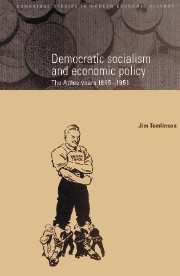Book contents
- Frontmatter
- Contents
- List of tables
- Acknowledgements
- List of abbreviations
- 1 Introduction: Labour and the economy 1900–1945
- 2 Labour and the international economy I: overall strategy
- 3 Labour and the international economy II: the balance of payments
- 4 Industrial modernisation
- 5 Nationalisation
- 6 Controls and planning
- 7 The financial system
- 8 Employment policy and the labour market
- 9 Labour and the woman worker
- 10 Towards a Keynesian policy?
- 11 The economics of the welfare state
- 12 Equality versus efficiency
- 13 Conclusions: political obstacles to economic reform
- Bibliography
- Index
6 - Controls and planning
Published online by Cambridge University Press: 09 November 2009
- Frontmatter
- Contents
- List of tables
- Acknowledgements
- List of abbreviations
- 1 Introduction: Labour and the economy 1900–1945
- 2 Labour and the international economy I: overall strategy
- 3 Labour and the international economy II: the balance of payments
- 4 Industrial modernisation
- 5 Nationalisation
- 6 Controls and planning
- 7 The financial system
- 8 Employment policy and the labour market
- 9 Labour and the woman worker
- 10 Towards a Keynesian policy?
- 11 The economics of the welfare state
- 12 Equality versus efficiency
- 13 Conclusions: political obstacles to economic reform
- Bibliography
- Index
Summary
If there was one word that characterised Labour's approach to the economy in the 1940s that word would be ‘planning’. In fact this was so from quite early in the previous decade. After 1931, as Stephen Brooke notes, ‘the lingua franca of Labour's resurgent socialism in this regard was planning … Indeed to those within the Labour Party, planning and socialism became interchangeable terms.’ The broad development of Labour's policies in this direction have been outlined in the first chapter of this book, but this chapter focuses on planning both as a doctrine and as evolving policy in these decades. Whilst, of course, the main concern here is with the 1940s, the political and analytical context of the debates on planning in the 1930s is important.
Another feature of planning in the 1940s was that policy debates took place in the context of a much wider intellectual debate amongst economists. Disputes over economic planning were concerned with theoretical issues as well as policy in the 1940s, and whilst the primary concern of this book is policy, it is important to contextualise it with some account of the more theoretical debate.
The general debate in the 1930s
One of the obvious difficulties in discussing the background to the planning arguments of the 1940s is the diverse meanings given to the term ‘planning’. In this chapter it will normally be used to mean the allocation of resources by means other than markets.
- Type
- Chapter
- Information
- Democratic Socialism and Economic PolicyThe Attlee Years, 1945–1951, pp. 124 - 146Publisher: Cambridge University PressPrint publication year: 1996

